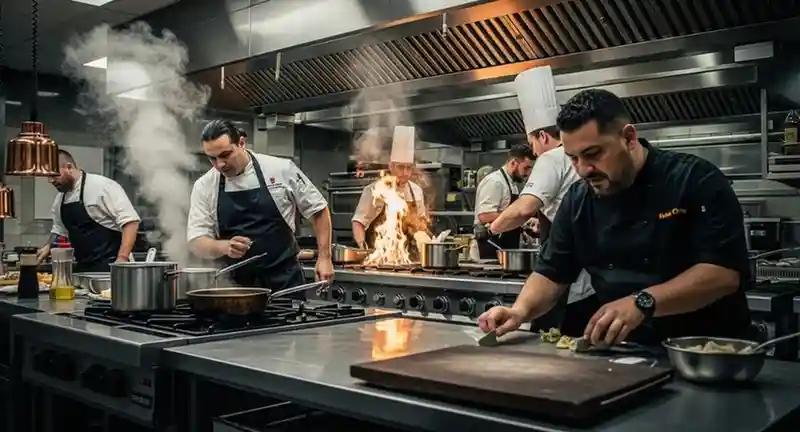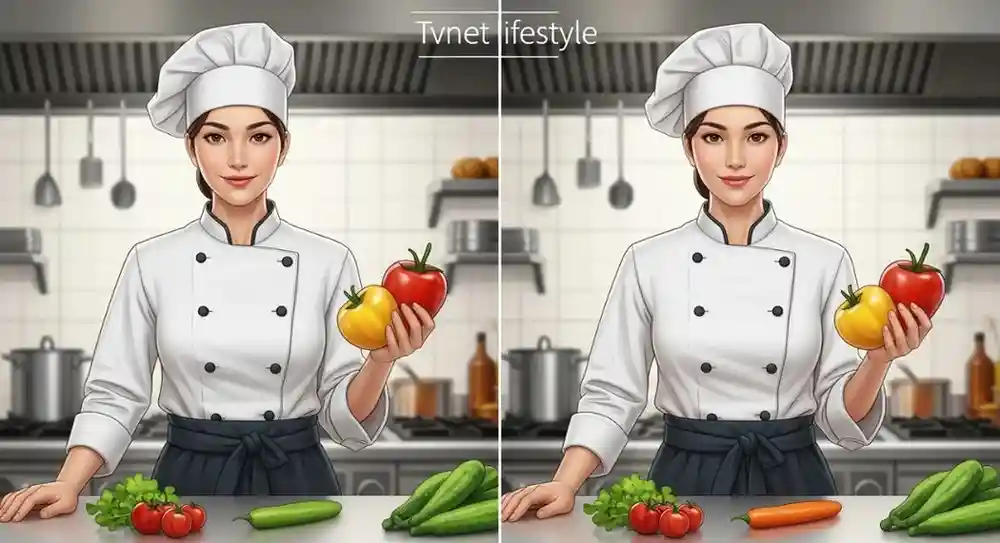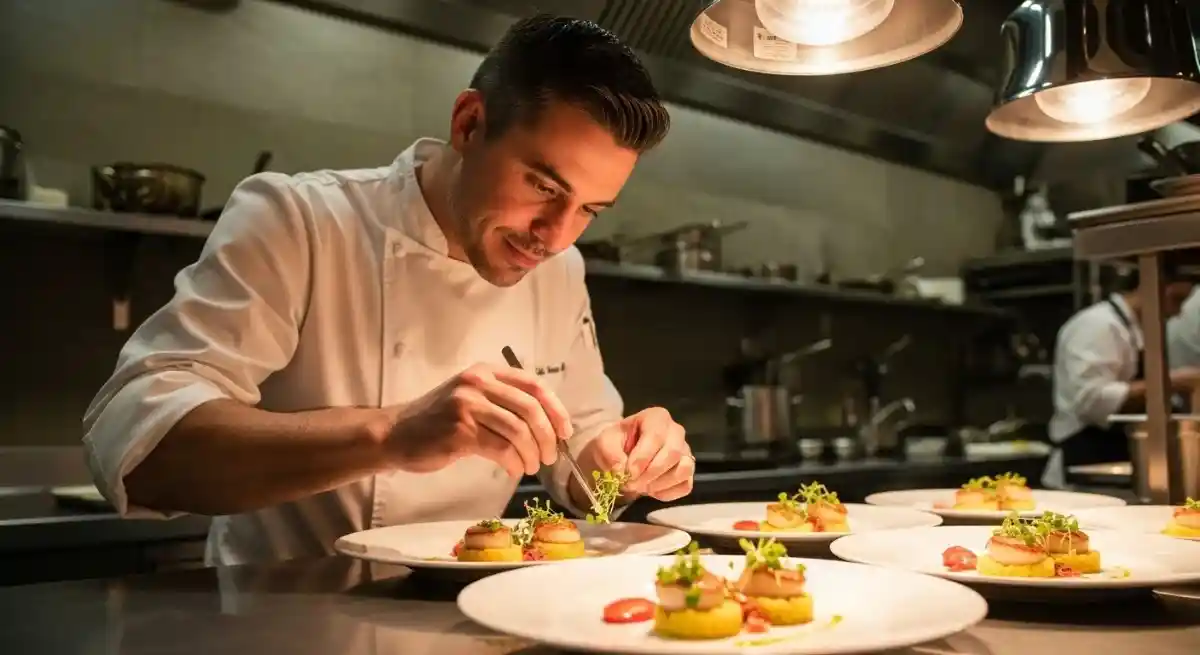Introduction: When a Winner Returns and Fans Take Notice
When Nona Sivley stepped back into the Hell’s Kitchen kitchen for Season 11, viewers who remembered her triumphant Season 8 victory immediately noticed something different. The confident chef who had impressed Gordon Ramsay and earned the head chef position at LA Market looked noticeably changed, sparking countless online discussions and questions about what had happened in the years between her appearances.
The internet being what it is, speculation ran rampant. Forums filled with theories, social media buzzed with observations, and fans debated everything from her appearance to her demeanor. But amid all the noise and conjecture, what actually happened to Nona Sivley? What do we know based on facts rather than speculation?
This article examines Nona’s Hell’s Kitchen journey with respect and accuracy, focusing on publicly available information about her career, the demands of the culinary industry, and the realities of reality television. We’ll address what fans observed, explore the lifestyle factors that affect chefs in high-pressure environments, and celebrate Nona’s achievements without engaging in harmful speculation about her personal health or private matters.
Let’s separate fact from fiction and give this talented chef the respectful coverage she deserves.
Who is Nona Sivley? The Season 8 Champion
From Contestant to Winner
Nona Sivley entered Hell’s Kitchen Season 8 as a 28-year-old chef from Atlanta, Georgia, bringing Southern charm and serious culinary skills to one of reality television’s most demanding competitions. Throughout the season, which aired in 2010, Nona demonstrated not only technical proficiency but also leadership qualities that would ultimately secure her victory.
Her journey through Season 8 showcased a chef who could handle pressure, maintain composure during Gordon Ramsay’s infamous critiques, and rally her team during challenging dinner services. Nona’s cooking style reflected her background, incorporating bold flavors and creative approaches that impressed both the judges and diners at Hell’s Kitchen.
The Prize and Promise
Winning Hell’s Kitchen Season 8 came with a significant prize: a head chef position at LA Market in Los Angeles, part of the JW Marriott at LA Live, with a salary of $250,000. This wasn’t just a television prize; it was a genuine career opportunity at a high-profile restaurant in one of America’s major culinary markets.
For Nona, this represented the culmination of years of culinary training and the validation of her skills on a national platform. The victory positioned her among an elite group of chefs who had survived Gordon Ramsay’s kitchen and earned his respect—no small feat given his exacting standards.
Why Nona Stood Out
What made Nona memorable during Season 8 wasn’t just her cooking ability. Viewers connected with her personality, which balanced confidence with humility and determination with approachability. She demonstrated emotional intelligence in managing team dynamics and showed resilience when services didn’t go as planned.
Her approach to leadership emphasized collaboration rather than confrontation, a style that sometimes gets overlooked in the high-drama environment of Hell’s Kitchen but proved effective when it mattered most. Nona’s ability to stay focused on the goal while maintaining professional relationships with fellow contestants set her apart.
Nona’s Return to Hell’s Kitchen in Season 11
The All-Stars Format
Hell’s Kitchen Season 11, which premiered in 2013, featured a special twist: several episodes included appearances by former contestants and winners returning to interact with the current competitors. This format allowed viewers to see how previous seasons’ chefs had progressed in their careers and provided mentorship opportunities for the new contestants.
Nona Sivley appeared in this capacity, returning to the kitchen where she had achieved her greatest television success just a few years earlier. For fans who had followed her Season 8 journey, her return was highly anticipated—a chance to see how the winner had evolved and what she’d accomplished with her prize.
What Fans Immediately Noticed
When Nona appeared on screen during Season 11, online forums and social media immediately lit up with observations. Viewers noted that she looked considerably different from her Season 8 appearance, with noticeable weight loss being the most commonly discussed change. Beyond physical appearance, some fans commented on differences in her energy, her confidence level, and her overall demeanor.
These observations weren’t inherently negative or positive—they were simply what viewers noticed when seeing someone they remembered from a previous season. However, the speculation that followed ranged from concerned to conspiratorial, with theories about what might have caused such visible changes.
The Reality TV Microscope
It’s important to understand the context of these observations. Reality television places contestants under intense scrutiny, with high-definition cameras capturing every angle and moment. Viewers form parasocial relationships with contestants, feeling invested in their lives despite knowing only what’s shown on screen.
When someone reappears on television after a significant time gap, any changes become magnified. The three-year period between Nona’s seasons was documented only through what she chose to share publicly, leaving gaps that viewers naturally tried to fill—often with speculation rather than facts.
Understanding Physical Changes in High-Pressure Culinary Careers
The Demanding Nature of Professional Cooking
Professional kitchens operate under conditions most people never experience. Executive chefs and head chefs routinely work 60-80 hour weeks, often on their feet for 12-14 hours straight. The physical demands include constant movement, exposure to heat, and limited opportunities for regular meals during service.
These working conditions naturally affect a chef’s body and appearance. Weight fluctuations, changes in muscle tone, differences in energy levels, and variations in overall appearance are common among culinary professionals, particularly those in high-pressure, high-profile positions like the one Nona earned through her Hell’s Kitchen victory.
Lifestyle Factors in the Restaurant Industry
The restaurant industry’s irregular schedules make maintaining consistent health routines challenging. Chefs often work nights, weekends, and holidays—times when gyms are closed and healthy food options are limited. The stress of managing a kitchen, meeting financial targets, and maintaining quality standards takes both mental and physical tolls.
For someone in Nona’s position, taking on a head chef role at a major restaurant would have meant navigating all these challenges while also dealing with the pressure of representing Hell’s Kitchen and meeting the expectations that came with being a televised winner. This level of responsibility and visibility adds layers of stress beyond what most chefs experience.
Career Transitions and Their Effects
We know that Nona’s career path after Hell’s Kitchen involved various transitions and opportunities. Career changes, relocation, adapting to new environments, and the uncertainty that can accompany professional shifts all contribute to lifestyle changes that may affect someone’s appearance and well-being.
Without specific statements from Nona herself about her personal health journey, we can only acknowledge these general factors that affect many professionals in similar situations. Speculation about specific causes serves no productive purpose and ventures into territory that’s both disrespectful and potentially harmful.

How Reality Television Affects Contestants
The Pressure Cooker Environment
Hell’s Kitchen isn’t just a cooking competition; it’s a pressure-filled environment designed to test contestants to their limits. Long filming hours, sleep deprivation, constant competition, and the stress of performing for cameras all take their toll. Contestants often report losing weight during filming due to these factors, even when adequate food is available.
When contestants return to normal life after filming, their bodies adjust to the absence of this extreme stress. Some gain back weight they lost during competition, while others continue to experience changes as they process the experience and reestablish regular routines.
The Years Between Appearances
Between Season 8 and Season 11, Nona lived three years of life that wasn’t documented on television. During this time, she navigated her career, dealt with personal matters, experienced successes and challenges, and evolved as both a chef and a person. Three years represents significant time for anyone to change, and expecting someone to look identical to their previous television appearance sets unrealistic standards.
Reality television captures snapshots of people’s lives, not comprehensive documentaries. The person viewers see on screen represents just a fraction of someone’s complete existence, and drawing conclusions based on these limited glimpses can be misleading.
The Impact of Public Scrutiny
Being on a popular television show means having your appearance analyzed by thousands or millions of viewers. For some people, this scrutiny is empowering; for others, it’s overwhelming. The awareness that people are watching, judging, and discussing you can affect behavior, self-image, and decisions about health and appearance.
We don’t know specifically how public attention affected Nona, but it’s worth considering as a factor that distinguishes her experience from that of chefs who pursue their careers outside the public eye.
Nona’s Career After Hell’s Kitchen
The LA Market Experience
Following her Season 8 victory, Nona took on the role of head chef at LA Market, the prize that came with winning the competition. This position placed her in a high-profile restaurant environment where she had opportunities to implement her culinary vision and lead a professional kitchen team.
Details about the duration and specifics of her tenure at LA Market haven’t been extensively publicized, which is common in the restaurant industry where chef positions can be fluid and transitions aren’t always announced publicly. What matters is that Nona had the opportunity to work at this level and gained valuable experience in restaurant leadership.
Continued Culinary Work
Based on publicly available information, Nona has continued working in the culinary field following her Hell’s Kitchen experience. The skills she demonstrated on the show—leadership, creativity, technical proficiency, and resilience—are assets that serve chefs throughout their careers, regardless of whether they remain in high-profile positions.
Many Hell’s Kitchen alumni find that their television exposure opens doors to various opportunities: consulting work, private chef services, culinary instruction, restaurant partnerships, and other ventures that leverage both their skills and their recognizability. While Nona has maintained a relatively low public profile compared to some winners, this doesn’t indicate a lack of success—it may simply reflect a preference for working outside the spotlight.
Life Beyond Television
Not every Hell’s Kitchen winner chooses to remain in the public eye or pursue celebrity chef status. Some winners, having proven themselves on television, prefer to focus on their craft, build sustainable careers, and live their lives without constant media attention.
Nona’s relative privacy following her television appearances is her prerogative. The culinary world offers numerous paths to fulfillment and success that don’t require constant social media presence or public visibility. Respecting her choice to maintain privacy while acknowledging her achievements represents the appropriate balance.
Fan Discussions and Online Observations
The Nature of Viewer Commentary
When Nona returned for Season 11, online discussions ranged from concerned observations to inappropriate speculation. Some fans expressed genuine worry, wondering if she was okay. Others made assumptions about causes for her changed appearance, venturing into territory that crossed lines of respectful discourse.
These discussions highlight both the positive and negative aspects of reality television fandom. On one hand, viewers felt connected enough to Nona to notice changes and care about her well-being. On the other, the anonymity and distance of online forums sometimes led to comments that wouldn’t be acceptable in face-to-face conversation.
Separating Observation from Speculation
There’s an important distinction between noting that someone looks different and speculating about why. Observing that Nona’s appearance changed between seasons is factual—viewers could see this difference. Theorizing about specific causes without evidence, however, ventures into speculation that can spread misinformation and potentially cause harm.
Unfortunately, online discussions don’t always maintain this distinction. Theories presented as facts, assumptions treated as knowledge, and speculation shared as insight can create false narratives that persist long after the initial observations.
The Responsibility of Public Discussion
When discussing real people who’ve appeared on television, it’s worth remembering they’re real people—not characters, not public property, but individuals with private lives, personal struggles, and human dignity. The entertainment they provided doesn’t entitle viewers to unlimited access to their personal information or license to make invasive assumptions about their health, relationships, or private matters.
Nona Sivley deserves the same respect and privacy considerations we’d want for ourselves or our loved ones. Celebrating her achievements, acknowledging her skills, and respecting her privacy represent the appropriate response to curiosity about her life after Hell’s Kitchen.
Other Hell’s Kitchen Alumni and Appearance Changes
A Common Pattern
Nona isn’t the only Hell’s Kitchen contestant whose appearance changed between seasons or over the years following their participation. The show’s history includes numerous examples of chefs who looked noticeably different when returning for special episodes or appearing in later seasons.
These changes reflect the realities discussed earlier: time passes, careers evolve, lifestyles shift, and people change. The culinary industry’s demands, combined with the unique pressures of reality television participation, create conditions where appearance changes are more likely than in many other professions.
Learning from Comparisons
Examining how fans and media have treated other contestants who experienced visible changes can be instructive. In many cases, excessive speculation has been proven wrong when contestants eventually shared their actual experiences. This pattern should encourage caution and humility when discussing people’s appearances without their input.
The best approach is acknowledging that we don’t know the full story unless the person chooses to share it. Assumptions, even well-intentioned ones, can be wildly inaccurate and potentially harmful.
The Broader Context of Reality TV Transformations
How Competition Shows Affect Contestants
Research and contestant reports indicate that reality competition shows can significantly impact participants’ physical and mental health. The combination of stress, irregular schedules, performance pressure, and sudden fame creates conditions unlike typical life experiences.
For culinary competition shows specifically, contestants deal with additional factors: constant exposure to food while under stress (which can affect eating patterns), physical exhaustion from long kitchen hours, and the emotional toll of competition and criticism.
Life After Reality Television
Transitioning from reality television back to normal life presents unique challenges. Contestants must readjust to life without cameras, process their televised experience, navigate any fame or recognition they’ve gained, and figure out how to leverage (or move beyond) their television appearance in their professional lives.
Some contestants thrive with the attention and opportunities; others find it overwhelming and prefer to return to relative anonymity. There’s no single correct way to handle post-reality TV life, and people’s choices in this regard deserve respect.
Addressing Common Misconceptions
Myth: Dramatic Changes Always Indicate Problems
Visible changes in appearance don’t necessarily indicate negative circumstances. People lose or gain weight for countless reasons: lifestyle changes, intentional health decisions, stress, happiness, career shifts, aging, and natural body fluctuations. Assuming that weight loss specifically indicates problems reflects bias rather than logic.
Myth: Public Figures Owe Explanations
While curiosity is natural, public figures—including reality television contestants—don’t owe audiences explanations about their personal health, appearance changes, or private decisions. The entertainment they provided doesn’t create an obligation to share intimate details of their lives.
Myth: Speculation Is Harmless
Online speculation about people’s health, substance use, or personal struggles can be deeply harmful, even when not intended maliciously. These discussions can spread misinformation, reinforce stigma, cause distress to the person being discussed, and contribute to a culture where invasive commentary is normalized.
What We Actually Know: Sticking to Facts
Verified Information About Nona
Based on publicly available information, here’s what we know factually about Nona Sivley:
- She won Hell’s Kitchen Season 8 in 2010
- She earned a head chef position at LA Market as her prize
- She returned to Hell’s Kitchen for Season 11 in 2013
- Her appearance was noticeably different during her Season 11 appearance
- She has maintained a relatively private profile since her television appearances
- She has continued working in the culinary field
What We Don’t Know
We don’t have verified public statements from Nona about:
- Specific reasons for changes in her appearance
- Details about her health, medical history, or personal wellness journey
- Her complete career trajectory since LA Market
- Her personal life, relationships, or private circumstances
- Her feelings about fan speculation and online discussions
Without this information directly from Nona, respectful silence or general acknowledgment is more appropriate than detailed speculation.

Pros and Cons of Following Reality TV Chef Journeys
Advantages of Staying Connected
Career Support: Following chefs after their television appearances allows fans to support their continued work, patronize their restaurants, and help them build successful post-TV careers.
Inspiration: Seeing how contestants navigate challenges and build careers after reality television can inspire others pursuing culinary careers or dealing with their own life transitions.
Community: Fan communities can provide positive support, celebrate achievements, and create connections among people who share interest in cooking and competition shows.
Learning: Watching professional chefs’ careers evolve offers insights into the culinary industry, restaurant operations, and the realities of professional cooking.
Disadvantages and Concerns
Privacy Invasion: Excessive interest in contestants’ personal lives can cross boundaries and make it difficult for them to maintain privacy or move beyond their television appearance.
Harmful Speculation: Online discussions can veer into harmful territory, spreading misinformation or making invasive assumptions about health, relationships, or personal matters.
Unrealistic Expectations: Fans sometimes expect contestants to remain accessible, unchanged, or continuously visible, creating pressure that may conflict with contestants’ actual desires or needs.
Parasocial Relationships: The one-sided nature of viewer-contestant relationships can lead to feelings of entitlement or ownership that aren’t appropriate or healthy.
Frequently Asked Questions
What happened to Nona after Hell’s Kitchen?
After winning Hell’s Kitchen Season 8, Nona Sivley took on the head chef position at LA Market in Los Angeles, the prize that came with her victory. She has continued working in the culinary field, though she has maintained a relatively private profile compared to some other Hell’s Kitchen winners. Specific details about her current work aren’t widely publicized, which is her prerogative as someone choosing to focus on her craft rather than celebrity.
Why did Nona look different in Season 11?
When Nona returned for Hell’s Kitchen Season 11, approximately three years after her Season 8 victory, viewers noticed visible changes in her appearance, including weight loss. The specific reasons for these changes haven’t been publicly disclosed by Nona herself. Many factors can contribute to appearance changes over time, including the demanding nature of culinary careers, lifestyle shifts, career transitions, and the general evolution that occurs over several years of someone’s life.
Where is Nona Sivley now?
Nona has maintained a relatively private profile since her Hell’s Kitchen appearances. While she hasn’t maintained a high-profile public presence through social media or media appearances, this doesn’t indicate a lack of success—many culinary professionals prefer to focus on their work rather than maintaining celebrity status. Without recent public statements or appearances, specific information about her current location and work isn’t readily available.
Did Nona return to cooking after the show?
Yes, Nona continued working in the culinary field following her Hell’s Kitchen victory. She took on the head chef position at LA Market as her prize and has maintained involvement in the culinary industry. The specific trajectory of her career hasn’t been extensively documented publicly, which is common for many chefs who work professionally outside the spotlight.
Why do Hell’s Kitchen chefs often change between seasons?
When contestants return to Hell’s Kitchen after appearing in previous seasons, viewers often notice changes in appearance. Several factors contribute to this: the extreme stress and demanding conditions during filming can cause temporary weight loss or other changes; time passing between seasons means natural aging and life changes; career pressures in the culinary industry affect lifestyle and appearance; and the transition from everyday life to television and back can impact someone’s physical presentation. These changes are normal and don’t necessarily indicate any problems.
How can fans support former Hell’s Kitchen contestants?
The best way to support former contestants is by patronizing their restaurants if they’re publicly operating culinary businesses, following their work respectfully if they maintain public profiles, avoiding invasive speculation about their personal lives, celebrating their achievements in the culinary field, and recognizing that their value extends far beyond their television appearance. Respecting their privacy while acknowledging their skills represents appropriate fan behavior.
Is it appropriate to discuss contestants’ appearance changes?
While noticing that someone looks different is natural, extended speculation about the specific causes of appearance changes ventures into inappropriate territory, especially regarding health or personal matters. The respectful approach is acknowledging observable changes without making assumptions about causes, avoiding theories about medical conditions or substance use, and recognizing that people’s appearances naturally change over time for countless reasons that are none of our business unless they choose to share.
Conclusion: Celebrating Achievement, Respecting Privacy
Nona Sivley’s Hell’s Kitchen journey represents a significant achievement in the competitive culinary world. Her Season 8 victory demonstrated skill, resilience, and leadership that earned Gordon Ramsay’s respect—a validation that carries weight in professional cooking circles.
When she returned for Season 11, viewers noticed changes, sparking discussions that ranged from concerned observations to inappropriate speculation. What we know factually is that time had passed, careers had evolved, and life had continued in the years between her appearances. What we don’t know—and what we shouldn’t presume to know—are the specific personal details of her health, her struggles, or her private journey.
The culinary industry is demanding, reality television creates unique pressures, and three years is ample time for anyone to experience significant life changes. None of these observations require dramatic explanations or warrant invasive speculation.
As we discuss reality television contestants and their journeys, we have a responsibility to maintain respect, stick to facts, and avoid the harmful speculation that can flourish in online spaces. Nona Sivley deserves recognition for her achievements and respect for her privacy. Her worth isn’t determined by maintaining a public profile or explaining personal changes to curious fans—it’s established by her skills as a chef and her accomplishment in winning one of culinary television’s toughest competitions.
The next time you encounter discussions about reality TV contestants’ appearances or personal lives, consider whether the conversation maintains respect and dignity. Ask yourself whether you’re contributing to helpful dialogue or harmful speculation. Choose to celebrate achievements, respect boundaries, and recognize that the entertainment someone provided doesn’t entitle us to unlimited access to their private life.
Share this article if you believe in respectful, fact-based coverage of reality television personalities. Together, we can create online spaces that celebrate achievement without crossing into invasive territory



